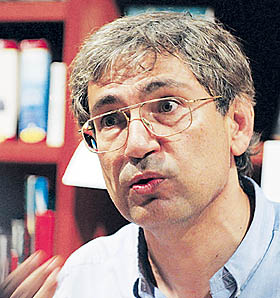De Turkse schrijver Orhan Pamuk (54) heeft de Nobelprijs voor Literatuur 2006 gewonnen. ‘In zijn zoektocht naar de melancholieke ziel van zijn geboortestad heeft Pamuk nieuwe symbolen voor de botsing en interactie van culturen ontdekt’, aldus Zweedse Academie voor Wetenschappen in haar motivering.
Orhan Pamuk werd geboren op 7 juni 1952 in Istanbul. Pamuk geniet internationaal aanzien als een van de grootste Turkse schrijvers van het moment en van deze eeuw. Belangrijkste thema’s in zijn werk zijn de conflicten en de tegenstellingen tussen Oost en West, Islam en christendom, traditie en moderniteit. Expliciete uitspraken over de Armeense kwestie en het gewapende conflict met de Koerden hebben samen met zijn status als intellectueel hem in Turkije al sinds enige tijd tot een controversieel persoon gemaakt. Afhankelijk van wie het gevraagd wordt is hij of een groot schrijver of een landverrader. In oktober 2005 werd aan hem bij de Frankfurter Buchmesse de Vredesprijs van de Duitse Boekhandel uitgereikt.
Uit: Snow (Sneeuw, hoofdstuk1)
“The silence of snow, thought the man sitting just behind the bus driver. If this were the beginning of a poem, he would have called the thing he felt inside him the silence of snow.
He’d boarded the bus from Erzurum to Kars with only seconds to spare. He’d just come into the station on a bus from Istanbul—a snowy, stormy, two-day journey—and was rushing up and down the dirty wet corridors with his bag in tow, looking for his connection, when someone told him the bus for Kars was leaving immediately.
He’d managed to find it, an ancient Magirus, but the conductor had just shut the luggage compartment and, being “in a hurry,” refused to open it again. That’s why our traveler had taken his bag on board with him; the big dark-red Bally valise was now wedged between his legs. He was sitting next to the window and wearing a thick charcoal coat he’d bought at a Frankfurt Kaufhof five years earlier. We should note straightaway that this soft, downy beauty of a coat would cause him shame and disquiet during the days he was to spend in Kars, while also furnishing a sense of security.
As soon as the bus set off, our traveler glued his eyes to the window next to him; perhaps hoping to see something new, he peered into the wretched little shops and bakeries and broken-down coffeehouses that lined the streets of Erzurum’s outlying suburbs, and as he did it began to snow. It was heavier and thicker than the snow he’d seen between Istanbul and Erzurum. If he hadn’t been so tired, if he’d paid a bit more attention to the snowflakes swirling out of the sky like feathers, he might have realized that he was traveling straight into a blizzard; he might have seen at the start that he was setting out on a journey that would change his life forever and chosen to turn back.
But the thought didn’t even cross his mind. As evening fell, he lost himself in the light still lingering in the sky above; in the snowflakes whirling ever more wildly in the wind he saw nothing of the impending blizzard but rather a promise, a sign pointing the way back to the happiness and purity he had known, once, as a child. Our traveler had spent his years of happiness and childhood in Istanbul; he’d returned a week ago, for the first time in twelve years, to attend his mother’s funeral, and having stayed there four days he decided to take this trip to Kars. Years later, he would still recall the extraordinary beauty of the snow that night; the happiness it brought him was far greater than any he’d known in Istanbul. He was a poet and, as he himself had written—in an early poem still largely unknown to Turkish readers—it snows only once in our dreams.”

Orhan Pamuk (Istanbul, 7 juni 1952)
